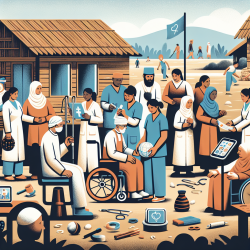In low-resource settings, access to professional rehabilitation services is often limited due to financial constraints, a shortage of skilled professionals, and inadequate infrastructure. This has led to an increasing interest in task-sharing strategies, where non-professional community-level workers or family caregivers are trained to deliver basic rehabilitation interventions. These strategies aim to improve the quality of life for individuals with physical impairments or disabilities by supplementing the existing healthcare framework.
The Effectiveness of Task-Sharing Strategies
A recent systematic review titled "Effectiveness of interventions by non-professional community-level workers or family caregivers to improve outcomes for physical impairments or disabilities in low resource settings: systematic review of task-sharing strategies" provides valuable insights into this approach. The review analyzed ten studies involving 2,149 participants, focusing on interventions delivered by non-professionals such as community health workers (CHWs) and family caregivers.
Key Findings
- Interventions delivered by family caregivers showed statistically significant improvements in mobility and activities of daily living (ADLs) in certain studies.
- Community health workers also demonstrated effectiveness in improving mobility and ADLs through structured training and support.
- The quality of evidence was rated as low to very low based on GRADE criteria, indicating a need for more robust research designs.
Implementing Task-Sharing Strategies
For practitioners looking to implement task-sharing strategies effectively, several considerations are crucial:
Training and Support
- Expertise of Trainers: Skilled professionals should provide comprehensive training to non-professionals, ensuring they are equipped with the necessary skills.
- Ongoing Support: Regular follow-up sessions and support mechanisms should be established to maintain intervention fidelity.
Simplifying Interventions
- Simplicity: Interventions should be straightforward and easy to understand for non-professionals.
- Cultural Sensitivity: Training materials should be culturally appropriate and accessible.
Leveraging Technology
- Digital Health Tools: Utilize mobile health (mHealth) technologies to facilitate training and support for community-level workers.
- Remote Supervision: Implement digital platforms for remote monitoring and guidance.
The Path Forward: Encouraging Further Research
The current body of evidence highlights the potential benefits of task-sharing strategies but also underscores the need for further research. Practitioners are encouraged to explore innovative approaches and contribute to the growing knowledge base in this area. By participating in research initiatives or collaborating with academic institutions, practitioners can help refine these strategies and improve rehabilitation outcomes globally.
To read the original research paper, please follow this link: Effectiveness of interventions by non-professional community-level workers or family caregivers to improve outcomes for physical impairments or disabilities in low resource settings: systematic review of task-sharing strategies.
Conclusion
The integration of task-sharing strategies into rehabilitation services offers a promising avenue for enhancing care delivery in low-resource settings. By addressing training needs, simplifying interventions, and leveraging technology, practitioners can play a pivotal role in improving access to rehabilitation services. Continued research and collaboration will be essential in refining these approaches and ensuring they meet the needs of diverse populations.










